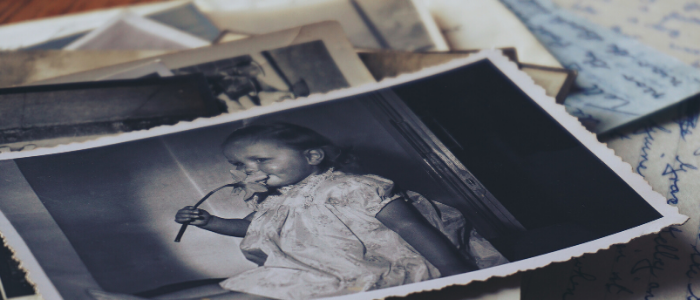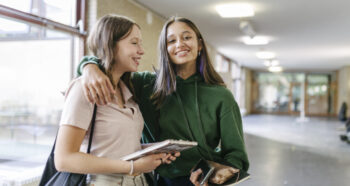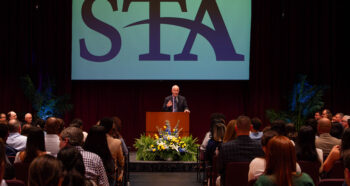The study of humanities is central to a well-rounded education. As the education writer Valerie Strauss set out in a 2017 Washington Post article:
“When you take courses in any humanities discipline, you are using different methods to learn about individuals, including yourself, and groups of people. You examine relationships and feelings, the feelings of others, as well as your own feelings. You develop empathy and an appreciation for others that can help address difficult situations, personal and professional.”
At this time of great societal and human disruption, it is more important than ever to help learners develop these tools to address difficult situations. While the Coronavirus pandemic has prompted much learning to go online, teaching humanities provides many opportunities to explore the extraordinary aspects of the ordinary off-line things that surround us.
Encourage learners to explore their own family history
This could be a great chance for learners to talk to their parents and/or grandparents and to hear their stories. While students are in school, their wellbeing relies on the quality of their relationships with other members of the school community. The extent to which the student feels connected to the people with whom they are learning has a big impact on their health, happiness and academic success. So, being at home, whilst challenging for some students in difficult personal circumstances, can also be a time for deeper relationships at home.

Teachers can encourage their students to listen as well as to talk to the people they are with – about belief, about locations visited, about times, events and situations experienced. In History or Geography, students often need to describe or explain an event. They could try to summarise what they have heard in three sentences, or in 20 words. Being concise and precise is a skill and it needs practice.
Seeing things from different perspectives
Students of religious studies, Islamic studies, Cambridge Global Perspectives or philosophy for instance, may be able to identify some of the morals in a news story, possibly also the logical fallacies in the arguments. Can they rewrite the same story from a different perspective? This is something that they could use in future university applications as part of a portfolio of their own work. It is a way of showing uniqueness as well as intellectual curiosity, and developing independent learning skills that will equip them for future life outside of formal education.
At The Perse School, we run our own research qualification if students don’t have the time to enter an external qualification. The act of independent research is the important thing here. The Cambridge International Project Qualification or the research component of Global Perspectives programmes are two excellent possibilities.
Learning about objects
Objects tell us much about the nature of society that has created them. Links to economics, geography and history abound. As an example, Gonville and Caius College at the University of Cambridge is running a historical essay competition for students in Year 12. Students are encouraged to consider, “Any object with a history, even a recent history… from an ancient Roman mirror to an early modern leather shoe; from a rotary dial telephone to a microwave; from a Georgian royal bed to an IKEA sofa”.

Teachers can encourage students to look around and see what they can find. Maybe it is a collection of items and they could map where in the world they have been made. Even clothes and furniture will have been made in a wide range of locations! Then, consider how you could group those locations: by continent, by trading bloc, by latitudinal band, for instance. Understanding connections helps us to think about them more deeply.
From learners to teachers
Learners could choose a topic they have already covered and think how they would like to teach it to somebody else. This is a very good way to help students process information and ideas.
Revise and re-learn
Re-seeing (or re-visioning) work is another good way to process learning. Students could write down all the strands of information they already know about a particular topic in a spider diagram on a large sheet, perhaps from memory. Teachers can help students revisit the syllabus and check what’s missing. For example, for Economics IGCSE 0455 or O Level 2281 students revising ‘Topic 5.1: Economic Development: living standards’, spider diagrams can be checked against the RAG checklist in the Learner Guide (available on the website).
Observational learning
Teachers can encourage students to look out of a window and write a summary of the landscape that they see and how it changes over different time periods – day to night, season to season. Geographers can then categorise some of these changes and identify the processes, physical or human that are causing them. They can also consider how this view has changed over a much longer time period. Google Earth has a ‘timeline’ tool which can be used to roll back the years and see many locations as they were historically. Cambridge Advanced students might wish to consider whether they can see ecological, economic or social processes dominating the view from their window and how these processes interact.
In conclusion, humanities subjects are constantly evolving, just as the world itself changes physically, economically, socially and politically. There will be many occasions from the current, extraordinary times that students will be able to learn from, so this is an opportunity to learn offline as well as online. To quote Valerie Strauss again: “through studying the humanities, one has the opportunity to get to know oneself and others better”.
References and further reading:
CAIE ‘Independent Learning’, https://www.cambridgeinternational.org/Images/580381-independent-learning.pdf
Gonville and Caius College History Essay Prize: https://www.cai.cam.ac.uk/sites/default/files/Caius_History_Challenge_2020_0.pdf
Relational Schools Project, https://relationalschools.org/
Sklar, J. (2020) Zoom Fatigue is taxing our brains:





